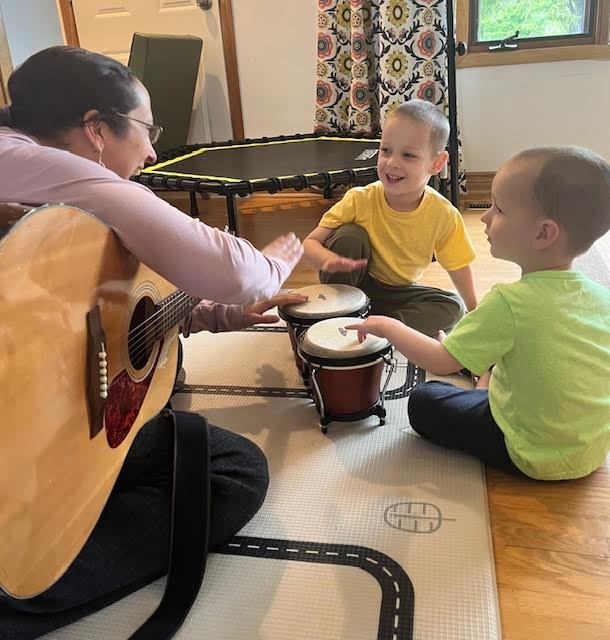Sign in
Join now, it's FREE!
“I’ve always loved music from a very young age. My parents got me my first keyboard when I was only four.”
Kimberly Samuel is a born and raised maritimer, singer, multi-instrumentalist and owner of Sudbury’s Harmony Through Music Therapy.
“I’ve been singing in choirs since elementary school, church choirs since grade five, so I was always highly involved in music. And I also always knew from a very young age that I wanted to help people in some way.”
After completing a Bachelor of Arts in Psychology from the University of New Brunswick, Samuel discovered music therapy. Being able to combine her desire to help others with her lifelong love of music, Samuel knew this was her path.
From there, Samuel graduated from Acadia University in Nova Scotia in 2012. After an internship in long-term-care, she worked as a subcontractor in Fredericton, N.B., before becoming part of a team of music therapists in Barrie, Ont. After moving with her husband to Sudbury in 2021, she opened Harmony Through Music Therapy in 2023.
Music therapy is “using music and its elements purposefully as a tool within a therapeutic relationship to achieve non-musical goals,” Samuel said. “We can work towards musical goals, but most often they’re either cognitive, communicative, emotional, physical, social, or spiritual goals.”
While from the outside it can be seen as such, music therapy is not simply a form of entertainment, nor do residents need to know how to play instruments to achieve their goals.
Samuel works primarily with patients who have Alzheimer's/Dementia, autism, cerebral palsy, developmental delays, Down Syndrome, mental health, or who are in hospice and palliative care; but music therapy can help a broad spectrum of individuals.
Music therapy interventions can include songwriting, instrument playing, lyric analysis, movement to music, singing, listening to music, music therapy songs that encourage particular responses or discussion, and improvisation.
Music therapy provides a great way to express emotions non-verbally in a safe environment, and is therefore useful for a wide range of individuals. Our bodies are music – our breath, our heartbeat. We are musical and everyone has the ability to respond to music, no matter their abilities.
Music therapists use the qualities of music to bring about change, improving wellness and quality of life in their clients.
It is evident how deeply Samuel cares for her clients, and how passionate she is about the work that she does.
She shares stories of working with clients over 100 years old, playing for palliative care residents as they passed away, playing call-and-response music for a nonverbal boy with cerebral palsy, seeing an autistic boy learn how to share and say a new word, and helping stroke victims verbalize their experience through songwriting and so much more.
Samuel also uses music therapy for her own emotional regulation when she needs it, through songwriting or using music to meditate.
“I do love playing Moonlight Sonata. There’s just something about it that’s so relaxing to me,” She said. “I really just try to embrace what I’m sharing with other people, the tools to use, and I try to remind myself to use them as well when needed.”
Samuel hopes that as interest in alternative forms of therapy become more popular, she will be able to grow her team to better serve the Sudbury area.
“I just really hope that people will learn what music therapy is, that it’s a valid therapy,” she said. “We undergo lots of education.”
Music therapists must complete a minimum Bachelor's degree in music therapy, a 1000-hour supervised internship, a board-certified exam, and then apply for certification through the Canadian Association of Music Therapists.
Those interested in experiencing the benefits of music therapy can have it covered under SSAH for those under 18, passport funding for developmentally disabled over 18, or as Samuel is also a registered psychotherapist, it can be claimed under the psychotherapy portion of an individual’s insurance.
If you’re interested in learning more about Samuel’s work, or Harmony Through Music Therapy, you can check out their website here.
© 2025 Sudbury.com
Spotlight: Sudbury music therapist brings healing through harmony – Sudbury News
RELATED ARTICLES
